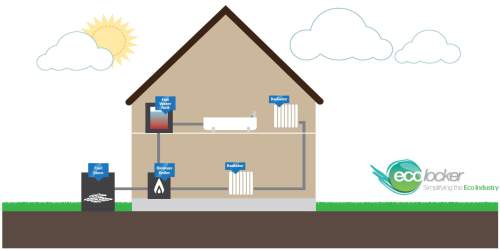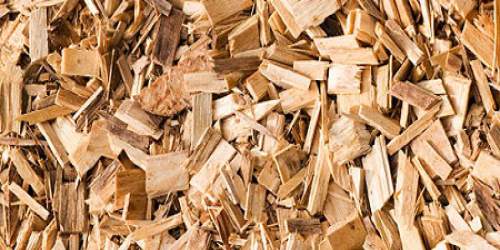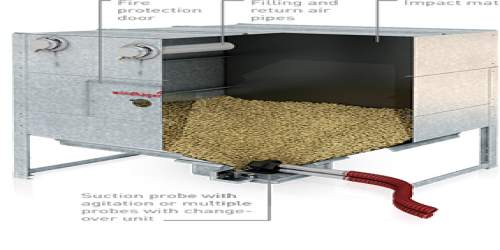Read Time : 4 Minutes
Benefits of Biomass and Pellet Boilers
Should I get a biomass system?
There are many benefits associated with installing a biomass boiler system in your home or business property:
Carbon emission depletion.
Biomass boilers play a pivotal role in mitigating carbon emissions and contributing to environmental sustainability. These boilers utilize organic materials such as wood pellets, agricultural waste, and forestry residues as fuel sources. The combustion of biomass generates energy, producing heat and electricity while emitting significantly lower carbon dioxide (CO2) levels compared to traditional fossil fuels like coal or oil.
One of the most notable benefits of biomass boilers is their potential to deplete carbon emissions. As these organic materials grow, they absorb CO2 from the atmosphere through photosynthesis. When burned, the CO2 released during combustion is balanced by the CO2 that the biomass absorbed while growing, creating a closed-loop carbon cycle. Consequently, biomass boilers are considered carbon-neutral over the long term, making them a vital tool in the fight against climate change.
By adopting biomass boilers, communities and industries can significantly reduce their carbon footprint, contributing to cleaner air and improved air quality. Furthermore, using biomass as a renewable energy source can decrease reliance on finite fossil fuels, ensuring a more sustainable energy future.
It is important to acknowledge that the success of biomass boilers in carbon emission depletion relies on responsible sourcing and sustainable practices to ensure the continued health of ecosystems and biodiversity.
COMPARE PRICES FROM LOCAL INSTALLERS
Compare prices from local companies fast & free
Enter your postcode to compare quotes from leading professionals. We promise to keep your information Safe & Secure. Privacy Policy
Biomass is good for local business.
Biomass can be sourced from within the UK. This offers security of supply but also cuts down on the emissions caused by transporting fuels from abroad. Sourcing fuel locally can also help local and national businesses.
Biomass boilers offer fantastic efficiency.
Modern biomass combustion systems are highly sophisticated, offering combustion efficiency and emission levels comparable with the best fossil fuel boilers. Using modern technology they can currently operate at 90% efficiency which is vastly higher than conventional boilers and electric heating systems. Like heat pumps and other renewable heating sources their efficiency also depends on how energy efficient your property is. The type of system you use, its flue and the air flow around the boiler are all aspects to consider as well. Most properties will benefit from additional energy efficiency work before the system is installed. Biomass boilers are efficient because they do not waste fuel and heat, ash can be disposed of easily and the CO2 that is created through the combustion process is equal to that consumed by the tree / plant matter or that would be released by the rotting matter after its natural expiration. To get the best from your boiler you should make sure you get a long standing company with a good reputation, preferably a company that specialises in this type of renewable energy source.
Biomass boilers integrate with other heating systems.
Biomass boilers can completely replace existing fossil fuel (gas, oil, LPG) boilers and provide all your space, under floor and water heating requirements but can also be integrated with a gas boiler or electric fire. Assuming that Thermostatic Radiator Valves (TRVs) are fitted, then the TRV will shut off as the room is warmed up by the biomass heating system. Many people prefer this type of warmth to that of a radiator as it is considered to be more ‘cosy’. You should ensure that your fire is installed by a competent person as this is a legal requirement and should ensure the installation is safe.
Biomass boilers offer fantastic financial benefits.
The initial price, in the region of £11,000 for a fully automatic boiler or £4,000 for a manual boiler can be redeemed at around £600 a year on average, if replacing an electric heating system. Don’t forget you may be eligible to receive payments from government schemes and initiatives. Biomass fuel prices are much more stable than that of fossil fuel and generally much lower. With a biomass boiler you can help protect yourself against Fossil fuel and electricity price appreciation. Buying biomass fuel in small amounts may prove expensive so having a large storage facility that can hold several tonnes can significantly lower your fuel expenses. Logs can be cheaper than pellets if you have a good local source. The Log Pile website can help you find suppliers in your area.
Government grants and initiatives.
The Boiler Upgrade Scheme for biomass and pellet boilers is a vital initiative aimed at promoting sustainable and eco-friendly heating solutions. Biomass and pellet boilers have gained popularity due to their renewable energy source and reduced carbon footprint, making them instrumental in the transition towards cleaner energy alternatives.
The scheme focuses on incentivizing homeowners and businesses to upgrade their traditional fossil-fuel-based boilers to more efficient biomass and pellet alternatives. By doing so, they not only reduce their greenhouse gas emissions but also contribute to mitigating the adverse effects of climate change.
Through the Boiler Upgrade Scheme, participants can access financial support to cover a portion of the costs associated with purchasing and installing biomass and pellet boilers. This financial assistance serves as a powerful incentive, encouraging widespread adoption of these environmentally friendly heating systems.
In addition to reducing carbon emissions, biomass and pellet boilers offer significant benefits such as lower heating costs, greater energy independence, and reduced reliance on non-renewable energy sources. The scheme not only benefits individual participants but also contributes to overall energy efficiency, making progress towards national and global sustainability targets.
Overall, the Boiler Upgrade Scheme plays a pivotal role in promoting a greener, cleaner future by harnessing the potential of biomass and pellet boilers as a viable alternative to conventional heating systems.
Maintenance.
Many boiler types require very little maintenance. Like any other boiler they should be serviced by a qualified service engineer. This said they generally require less maintenance than standard boilers and more general inspection to make sure they are functioning correctly. A visual inspection of the boiler and fuel feed system to check lubrication of bearings and to empty the ashbin will be required usually on at least a weekly basis. If the boiler is not fitted with automatic flue cleaning then regular cleaning of the flue tubes is required using a flue brush.
Automation.
Some biomass boiler systems can be fully automated and require virtually no user input. They can have automatic ignition and thermostatic control plus an integrated hopper which automatically tops up the fuel. They can then hold enough fuel in the burner and shoot for more than a few days needs and are topped up from the hopper that can hold anything up to a years supply.
Drawbacks of Biomass boilers
There are, however, certain drawbacks which must be born in mind, such as:
- Relatively high initial cost for system and installation, especially when compared with other energy savings measures such as insulation (although those who wish to install biomass systems enjoy a lower VAT rate (5%) on the installation cost.)
- Biomass systems are not a DIY job, and as such need to be installed by a qualified heating engineer
- Some systems such as log-fed boilers require a high level of human input
- Biomass boilers require a large amount of free space for the unit and fuel, and are therefore unsuitable for smaller properties, flats, as well as urban areas (this is changing though with manufacturers bringing smaller internal hopper fed boiler systems to market)
- The fuel must be delivered periodically
- Fuel availability can be limited in some areas
- Planning permission may be required
- More maintenance and cleaning is required than for other renewable heat energy technologies such as heat pumps
- As the units themselves are probably not sold in vast numbers, parts could be hard to get. Check with your installer for lead times should something go wrong, as you could potentially be left without heat for the time it takes to acquire the part and have it installed.
- Check what warranty is associated with your boiler and who is responsible for fixing it should it go wrong. Assess the lead times of repairs carefully and factor this into your decision about which boiler to go for. (Also consider the size and reputation of the manufacturer, are they likely to go out of business and what are the availability of parts for their units).
Find a local installer
Welcome to the biggest directory of UK renewable energy companies





 Is a Biomass Boiler suitable for my Property?
Is a Biomass Boiler suitable for my Property?





